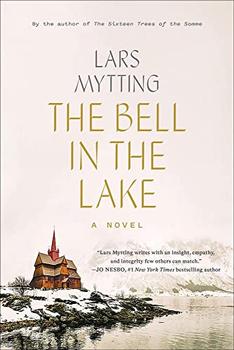Summary | Excerpt | Reading Guide | Discuss | Reviews | Beyond the Book | Readalikes | Genres & Themes | Author Bio

Sister Bells Trilogy #1
by Lars MyttingThe Girls Who Shared a Skin
THE BIRTH WAS HARD. THE HARDEST EVER PERHAPS, and that in a village where many births might compete for that title. The mother was large, but not until the third day of her confinement did they realise she was carrying twins. The details of the delivery, how long the screams reverberated in the log farmhouse, or how the womenfolk actually got the babies out – all this was forgotten. Too ghastly to be told, too ugly to be remembered. The mother tore and bled to death and her name vanished from history. For ever remembered, however, were the twins and their deformity. They were joined from the hip down. But that was all. They breathed, cried, and were lively.
Their parents were from the Hekne farm and the girls were baptised Halfrid and Gunhild Hekne. They grew, laughed a lot, and were never a bother, but a joy. To each other, to their father, to their siblings, to the village. The Hekne twins were put before the loom early, and sat for long days, their four arms flying in perfect time between warp and weft, so swiftly that it was impossible to see who was threading the yarn through their weave at any one moment. The pictures they wove were uniquely beautiful, often mysterious, and soon their weaves were traded for silver and livestock. At that time nobody thought of putting their mark on such craftwork, and later there were many who paid a high price for a hekneweave even when it was uncertain that it was genuine.
The most famous hekneweave showed Skrapanatta, the Night of the Great Scourge, the locals' version of the Day of Judgment, loosely related to the old Norse prophecy of Ragnarok. A sea of flames would turn the night into day, and when everything was burned up and the night darkened again, the earth's surface would be scoured, leaving nothing but bare rock, and come sunrise both the living and the dead would be swept to their doom. This weave was given to the church and hung there for generations, before it vanished overnight through locked doors.
The sisters rarely left the Hekne farmstead, even though they got about better than folk might think. They walked in a waltz-like rhythm, as if carrying a brimful water-pail between them. The slopes below the farm were the only thing that defeated them. Hekne was situated on a very steep incline, and in the winter the slippery paths were treacherous. But since it was a sunny slope, the spring thaw came early in the year, sometimes by March, and then the twins would come out with the springtime sun.
Hekne was among the earliest settlements in the valley, and the family had of course chosen one of the best spots for a farmstead. They owned not one, but two seters – summer farms – further up on the mountainside, each boasting a fine milking shed and dairy, and a herd of well-fed cows that grazed on the deep-green grass all summer. The farm also had easy access to Lower Glupen, a rich fishing lake with a handsome boathouse built with the thickest logs available. But the true measure of a farmer in Gudbrandsdalen was how much silver he owned. This was their bank vault, a visible and accessible reserve. No farmstead was worth the name, if it did not have cutlery for eighteen, and with their trade in weaves the Heknes had accumulated enough silver for thirty.
The Hekne twins were young women when one fell ill. The thought of what this might mean – that the survivor would have to drag her sister's corpse around with her – was unbearable. So their father, Eirik Hekne, went to the church and prayed for them to be allowed to die together.
His prayer was heard by the village pastor, and presumably by God. Death did claim the girls on the same day. As the end neared they demanded to be alone. Their father and siblings stood waiting by the door, and inside the girls' chamber they heard them talking about something that must be done. That day they finished the weave of Skrapanatta. They had started it a long time ago and now Gunhild would complete it alone, with Halfrid dead at her side and her arms no longer a help. Their father left Gunhild to work in peace, for when it came to the twins there was always something greater at work, something he and the others who scarce saw above the rocks or water's surface would and never could understand. Late in the evening a cough was heard, then the loom-comb fell to the floor.
Excerpt from the new book The Bell in the Lake by Lars Mytting published by The Overlook Press © 2020
Your guide toexceptional books
BookBrowse seeks out and recommends the best in contemporary fiction and nonfiction—books that not only engage and entertain but also deepen our understanding of ourselves and the world around us.